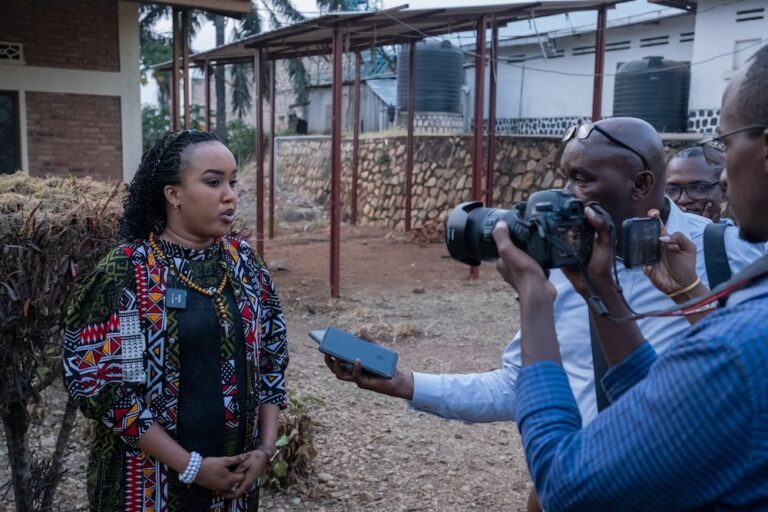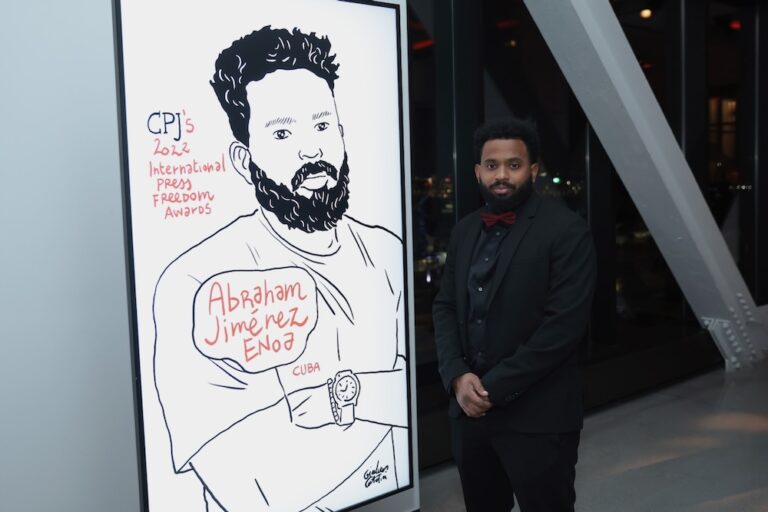(IAPA/IFEX) – The following is a 20 June 2002 IAPA press release: IAPA protests murders, attacks on journalists and assails laws curtailing press freedom The hemispheric free-press organization opens discussions at the Hemispheric Summit on Justice and Press Freedom in the Americas, during which judges and journalists will address legal issues affecting freedom of speech […]
(IAPA/IFEX) – The following is a 20 June 2002 IAPA press release:
IAPA protests murders, attacks on journalists and assails laws curtailing press freedom
The hemispheric free-press organization opens discussions at the Hemispheric Summit on Justice and Press Freedom in the Americas, during which judges and journalists will address legal issues affecting freedom of speech and the press in the Americas.
WASHINGTON, D.C. (June 20, 2002) – The Inter American Press Association (IAPA) noted today that its “main concern” continues to be the murder of journalists and the impunity of those responsible. The organization made the comment after reviewing the state of press freedom over the past three months in the Western Hemisphere at the meeting of its Executive Committee.
The IAPA’s governing body, meeting here on the eve of the IAPA-sponsored Hemispheric Summit on Justice and Press Freedom in the Americas, noted that in addition to the violence and the failure to bring the perpetrators to justice, “a shadow has been cast over” press freedom by a large number of various existing laws and proposed legislation curtailing this freedom.
On the other hand, in a country-by-country review of setbacks to press freedom in the past quarter, the IAPA hailed successful efforts recently in Mexico and Panama to pass legislation providing for access to public records. Another positive note was the elimination of the “contempt” offense from the Costa Rican Penal Code.
In addition to assaults on journalists in Argentina, Bolivia, Brazil, Cuba, El Salvador, Guatemala, Haiti, Mexico, Puerto Rico and Peru, the IAPA condemned the murder of five journalists in the past three months that led the organization to conduct its own investigations through its Rapid Response Unit. The slain journalists were María Teresa Guzmán de Carrasco of Bolivia, Tim Lopes of Brazil, Juan Carlos Gomez Díaz and Hugo Sandoval of Colombia, and Jorge Tortoza of Venezuela.
The IAPA took the opportunity to submit a new case to the Inter-American Commission on Human Rights after inquiring into the case of Colombian journalist Nelson Carvajal Carvajal, murdered on April 16, 1998, in Pitalito, Huila province, 307 miles from the Colombian capital, Bogotá.
The IAPA also drew special attention to innumerable court rulings ordering censorship of the press in Brazil and the sentencing of numerous journalists on libel charges.
The following are the most significant developments affecting news-gathering in the Americas in the past three months:
Argentina
Countless acts of violence against journalists and news media have been reported in a number of provinces in retaliation for journalistic work, particularly in several cities in Buenos Aires, Tucumán, Catamarca and Río Negro provinces.
An excessive tax burden, by imposition of value added tax on advertising, newsprint and the single-copy price of newspapers and magazines, could lead to the closure of sources of information. In addition, there are legislative bills pending, such as one on bankruptcy that would set limits on foreign ownership of the media and another bill that seeks to amend the Penal Code to provide for up to two years’ imprisonment for unauthorized broadcasting.
Bolivia
In addition to various incidents of violence against journalists reported from interior Bolivia in the wake of news reports about cocaine production, there was the astonishing murder of the joint editor of the La Paz newspaper El Diario, María Teresa Guzmán de Carrasco, on April 10. An explosive device blew off the back of the car in which she was riding. She was killed and her driver was injured.
Brazil
The disappearance and subsequent murder of Tim Lopes, a reporter for TV Globo, confirmed by Rio de Janeiro police on June 9, highlighted the lack of safety which journalists face while carrying out their work. There were also numerous assaults on and threats to journalists throughout the country.
Censorship was clamped, on court orders, on the Rio de Janeiro magazine Carta Capital and on a labor tribunal in São Paulo, while reporters from the newspapers Zero Hora in Porto Alegre, A Critica in Manaus, A Tarde in Salvador and the magazine Isto É, were found guilty on criminal libel charges. Their prison sentences were commuted to payment of a fine.
Costa Rica
In March, the Legislative Assembly eliminated the “contempt” offense by annulling Article 309 of the Penal Code. However, legal actions filed against individual journalists and news media continue to restrict freedom of expression and encourage self-censorship.
Chile
Presidential palace reporters criticized a restriction set by palace officials on coverage of official events.
A number of legal provisions that limit the exercise of freedom of expression remain in effect, such as criminal libel and slander, while the government’s pledge to decriminalize these has yet to be fulfilled.
Colombia
There were two murders, that of Juan Carlos Gomez Díaz in Aguachica, Cesar province, killed on April 3, and that of Héctor Sandoval, cameraman for RCN television, killed on April 12 as he was covering a clash between the Army and FARC guerrillas in Valle de Cauca.
Two journalists – Carlos Lajud and Carlos Pulgarín – fled the country while 17 others received threats over their reporting from individuals believed to be part of local political circles, guerrillas or paramilitaries.
The Congress is debating a bill on who may or may not work as a journalist.
Cuba
Harassment of independent journalists continues, along with restrictions on free speech. In May, Juan Carlos Garcell Pérez of the Eastern Free News Agency (APLO), was detained and beaten, while Jesús Joel Díaz of the Avila Independent Journalists Cooperative left Cuba in April.
A government decree at the beginning of the year banned the sale of computers, photocopy machines or any other printing device to any association, foundation, non-profit organization or individual.
El Salvador
Reporters from a number of media were beaten up by supporters of the Farabundo Martí Front at the instigation of a leader of that political party during May Day celebrations.
United States
The Judicial Conference, a subsidiary policy-making group for all federal courts, voted on March 13 to allow electronic access to civil cases. Beginning in May, the approved pilot program provided Internet users access to criminal court files. The heightened level of interest regarding terrorist activity motivated judges to reconsider the policy on public access to high profile criminal civil cases, ultimately leading to votes in favor of implementing the pilot program.
The government’s decision to close all immigration hearings on more than 1,000 detainees following the September 11 attacks was deemed unconstitutional by New Jersey District Judge John W. Bissell on May 29. However, a New Jersey appeals court ruled that the head of the U.S. Immigration and Naturalization Service has the authority to prevent the release of information. Representatives of the organizations requesting disclosure of detainee information considered the ruling as a destructive move against the public’s right to free access to information.
Guatemala
During the first week of June, reporters Marielos Monzon and Ronaldo Robles of Emisoras Unidas broadcasting service, Abner Guoz of El Periodico newspaper and Rosa María Bolaños of Siglo XXI were threatened in reprisal for their exposures of civil rights violations.
Journalist David Herrera was detained and threatened on April 10. He left the country shortly afterwards fearing for his life. Herrera, a freelance reporter, was investigating allegations linking government forces to recent murders.
Haiti
On May 27, reporters Darwin Saint Julien of the weekly Haiti Progres and Allan Deshommes of Radio Atlantik were injured while covering a demonstration and arrested by police, without charges being laid.
The murder of journalists Jean Leopold Dominique on April 3, 2000, Gerald Denoze on December 15, 2000 and Brignol Lindor on December 3, 2001 remain unsolved.
Mexico
The Federal Law on Transparency and Access to Government Public Records in Mexico was passed on April 29.
Numerous assaults on journalists were reported in a number of states. In addition, on May 30 the Jalisco State Superior Court of Justice ordered the re-arrest of two suspects in the December 1998 murder of American reporter Philip True. A judge had ordered their release from custody in August 2001.
Panama
News media voiced opposition to a legislative bill that sought to regulate news-gathering activity and stipulated that, among other things, only university graduates would be able to work as journalists. The bill would also create a Press Council with powers to make journalists found to be unethical pay damages.
Libel, slander and contempt continue to be used as the basis for legal actions to intimidate the press.
Paraguay
On May 19, the Paraguayan Chamber of Film and Television Producers presented a proposal to regulate local production of audiovisual and broadcast material, saying that there was a legal loophole that needed to be plugged to control the broadcast of foreign programming. This initiative was criticised because it was seen as potentially curtailing freedom of expression and work.
Peru
State Attorney Luis Vargas Valdivia rejected a request to appoint an administrator to take over the running of Expreso after a judge held that the newspaper was “the civilly responsible third party” in legal proceedings against its former editor and shareholder, Eduardo Calmell del Solar. Calmell, allegedly involved in corruption with Vladimiro Montesinos, remains in custody.
Three reporters, two of them in Lima and the other in Iquitos, were beaten up while covering various news stories.
Puerto Rico
There is a legislative bill on access to public records that would make a rare distinction between access to documents by the press and by ordinary citizens.
Dominican Republic
In April, the Dominican Journalists Colegio announced that it will propose to the National Congress that the law that created the Colegio be amended to include a provision requiring that individuals hold a university journalism school degree to work as journalists.
Venezuela
Photographer Jorge Tortoza from the newspaper 2001 was killed on April 11 as he covered clashes between supporters and opponents of President Hugo Chávez.
Following the April 11 coup d’état an atmosphere encouraging dialogue has been noted. However, on June 9, during his radio address “Alo Presidente”, Chávez warned the electronic media that he would rescind their operating licenses and punish them with imprisonment if they broadcast news that in his judgment was destabilizing propaganda.


